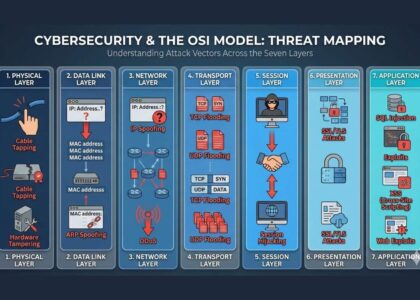Cybersecurity is that hot career path everyone keeps whispering about — like it’s a secret sauce for getting rich while wearing a hoodie. But is it really as high-paying as people say? Or is that just LinkedIn hype? Let’s dig in and figure out if cybersecurity is truly the digital gold rush we’ve been led to believe.
Spoiler alert: It can pay really well — but only if you know where you’re going and how to navigate the game.
First, What Even Is Cybersecurity?
Let’s get the definitions out of the way. Cybersecurity is the practice of protecting systems, networks, and programs from digital attacks. Think of it as locking up the internet version of your house — but with way more doors and windows (and hackers trying to sneak in 24/7).
Jobs in this field can range from:
- Ethical hacking (yes, you get paid to hack legally!)
- SOC (Security Operations Center) analyst roles
- Penetration testing
- Incident response
- Security engineering
- Governance, risk, and compliance (GRC)
- Cyber forensics and threat intelligence
- And more…
So, it’s not just one role — it’s an entire ecosystem.
Are Cybersecurity Jobs in Demand?
Absolutely. If you were to type “cybersecurity jobs” into any job portal right now, you’d see an avalanche of openings. The demand is huge and still growing — especially with remote work booming, AI entering the chat, and cyberattacks becoming more frequent and complex.
According to Cybersecurity Ventures, there will be 3.5 million unfilled cybersecurity jobs globally in 2025. That’s not a typo.
And when demand > supply, what happens?
Exactly: salaries shoot up. 🚀
So, Is Cybersecurity High Paying?
Let’s not waste your time: Yes. Cybersecurity can be high paying. But — and this is a big BUT — it depends on several factors. Your experience, role, certifications, location, specialization, and ability to stand out all play a part.
Let’s break this down:
Entry-Level Cybersecurity Salaries (Yes, Freshers!)
Starting out? You can still earn pretty decently.
In India 🇮🇳:
- SOC Analyst Level 1: ₹3–6 LPA
- Junior Penetration Tester: ₹4–7 LPA
- Security Analyst: ₹3–5.5 LPA
In the US 🇺🇸:
- Cybersecurity Analyst: $65,000–$90,000 per year
- Security Consultant (entry-level): $75,000–$95,000
- Incident Response Associate: $70,000–$100,000
Not bad for someone straight out of college, right?
Compare that with traditional IT support or software QA roles and you’ll see why cybersecurity attracts people like a magnet.
Mid-Level Cybersecurity Roles (2–5 Years Experience)
Now we’re talking serious money.
- Security Engineer: $90,000–$130,000
- Penetration Tester: $85,000–$125,000
- Threat Hunter: $100,000–$140,000
- Cloud Security Specialist: $110,000–$150,000
In India, mid-level professionals can make anywhere between ₹10–₹25 LPA depending on niche and company.
Yes, ₹25 LPA is achievable with just 4–5 years of relevant experience, especially if you’re working with MNCs or in the fintech or healthcare sectors (they pay extra for security).
Senior-Level Cybersecurity Positions (5+ Years)
This is where salaries really explode.
- Chief Information Security Officer (CISO): $160K–$400K+
- Cybersecurity Architect: $150K–$250K
- Red Team Lead / Blue Team Lead: $130K–$200K
- GRC Manager: $120K–$180K
- Freelance Security Consultant: ₹5000–₹25,000 per hour (Yes, hourly!)
Some freelance or consulting CISOs charge $500/hour. No joke. And companies pay — because a breach would cost them millions.
In India, senior-level cyber professionals can earn ₹30–₹80 LPA depending on how deep their expertise is and how rare their skill set is.
Location Matters — A LOT!
Cybersecurity jobs pay drastically different based on geography.
- In the US, cybersecurity salaries are among the highest in the world.
- In India, the salaries are growing rapidly, especially in metro cities and startup hubs.
- In Europe, the salaries are also strong, with countries like Germany, Switzerland, and the UK offering excellent compensation.
- Remote roles from global companies (especially startups in the US or EU) are now becoming a gold mine for Indian talent — pay in USD, work from home in INR.
Certifications = Salary Boosters?
Yes, big time. Some of the most recognized (and rewarded) certs are:
- CompTIA Security+ (Great for beginners)
- CEH (Certified Ethical Hacker)
- CISSP (Certified Information Systems Security Professional)
- OSCP (Offensive Security Certified Professional) – this one really makes you stand out
- CISM, CISA, GSEC, CRISC – especially for audit and risk roles
Each of these can increase your earning potential by ₹3–10 LPA or $10,000–$20,000 depending on your region and experience.
But hey — certs don’t replace skills. If you don’t know how to apply what you’ve learned, you won’t earn top dollar. Period.
Freelancing, Bug Bounties & Side Hustles
Here’s where cybersecurity becomes extra profitable:
- Bug bounty hunting: Top hunters earn $100,000+ a year just from platforms like HackerOne or Bugcrowd.
- Freelancing on Upwork or Fiverr: Offer penetration testing, audit reports, or consulting.
- Create a cybersecurity course or YouTube channel – Some infosec influencers are making over $10K/month from online content.
With enough hustle, cybersecurity can become not just your job — but your business. 🔥
The Myths You Should Avoid
“You need a degree to earn well in cybersecurity”
Nope. Skills > degree. Some of the highest earners in this field are self-taught hackers or career-switchers from totally unrelated fields.
“Certifications = Instant Money”
Wrong again. They help — but they don’t guarantee high pay. You still need real-world experience, problem-solving skills, and a solid portfolio.
“You have to move abroad to earn well”
False. Indian professionals are now working remotely for global clients, getting paid in dollars, and living comfortably in India.
What Actually Makes You High-Paid in Cybersecurity?
Here’s the unfiltered truth:
- You need to specialize. Generic “I know cybersecurity” won’t cut it. Become great in something — cloud security, red teaming, GRC, etc.
- Stay updated. This field evolves weekly. If your knowledge is from 2020, you’re already outdated.
- Build a portfolio. Do CTFs, bug bounties, GitHub projects, write blogs, and document your journey.
- Network smartly. Join infosec communities, Discord groups, and LinkedIn circles. Referrals matter.
- Know your worth. Learn salary benchmarks and don’t undersell yourself. Negotiate smartly.
Real Talk: Is It All About the Money?
Let’s be honest — money is a great motivator, but it shouldn’t be the only one.
Cybersecurity is a stressful, fast-paced, and high-responsibility field. You’ll often deal with:
- Late-night alerts
- Emergency incident responses
- Non-stop learning
- Imposter syndrome (yes, it’s real)
- Burnout if you don’t manage balance
So yes, it pays well — but you earn every rupee or dollar. Make sure you’re passionate about defending, researching, and solving puzzles.
Final Thoughts
So, is cybersecurity high paying?
Hell yes. But not instantly, and not passively.
You’ll have to hustle, specialize, learn constantly, and sometimes fail hard. But if you stick with it and play your cards right, you can build a career that not only pays well but also gives you the freedom and impact most jobs only dream of.
Cybersecurity is not just a career. It’s a lifestyle. One filled with curiosity, responsibility, and a little bit of badassery. 😎






